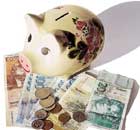Economy
China's economy hits annual target, concerns linger
(Xinhua)
Updated: 2010-01-21 19:33
 |
Large Medium Small |
Ma gave no breakdown of the GDP figures, but promised to release figures at the end of the month after verification. He added the economy would maintain steady and relatively fast economic development in 2010.
Although China's economic recovery was taking more hold strongly, Ma said uncertainties remained in China's economic development since the global recovery was not solidly grounded.
The NBS reported the nation's consumer price inflation added 1.9 percent in December, the second monthly rise after ending nine months of decline in November. The inflation at factory gate level also ended a 10-month fall last month with a rise of 1.7 percent.
Ma said the rising figures were also a warning that close attention should be paid to price changes and asset bubbles.
Runaway credit figures have stoked fears that loans have been funneled into the property and stock markets, inflating asset bubbles.
Housing prices soared 24 percent to 4,695 per square meter last year, the highest in 15 years.
To prevent excess liquidity and inflation, the central bank is slowly putting the brakes on credit growth.
The central bank has allowed one-year bill yields to rise more than expected and asked commercial lenders to keep more money in reserve.
"Although the outlook for consumer price inflation in 2010 is relatively mild in comparison to the inflationary surge in 2007 and 2008, unexpected spikes in food prices and commodity import bills pose risks that could alter this scenario," said Jing Ulrich, chairman of China equities and commodities of JP Morgan Chase.
Ulrich said inflation was unlikely to materialize in 2010 as the overall domestic demand was not high enough to ignite it.
Industrial overcapacity should limit the ability of manufacturers to pass increased raw materials costs on to consumers, she said in an e-mail.
Xiong Peng, an analyst with the Bank of Communications, forecast any interest rate rise would "not be realized until the second quarter."
But the central bank would adjust the reserve requirement ratio more frequently in the first quarter to balance monetary expansion, he said.
The authorities were more confident about the domestic economic picture than they were a year ago and were scaling back some of the more aggressive stimulus measures that had been introduced, Ulrich said.
"But there are still risks to the recovery, and therefore the exit strategy should be very gradual," Ulrich said.
Ma restated China's persistence in pushing forward economic restructuring, stressing the need to improve the quality and efficiency of growth.
The sole pursuit of growth rate was not desirable, he said.
China's total gross domestic output was 33.5 trillion yuan in 2009, closing the gap on Japan, the second-largest economy after the United States.
However, China was still a developing nation with 150 million people living below the international property line of US$1 a day.
"We should keep a sober mind on that," he said.














